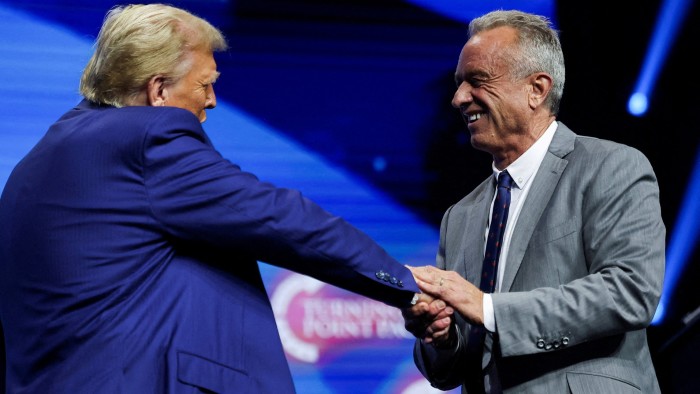Unlock the White House Watch newsletter for free
Your guide to what the 2024 US election means for Washington and the world
Two drug developers are pressing ahead with public listings in the coming months despite fears that Robert F Kennedy Jr’s nomination as the top US health official will suppress biotech valuations, in a test of the market’s willingness for risk.
Kennedy’s nomination as secretary of the US Department of Health and Human Services by president-elect Donald Trump has roiled biotech stocks, with shares of big pharma groups and other healthcare companies gyrating in the weeks since.
The nomination of Kennedy has raised concerns in the biotech industry due to his sceptical stance towards vaccines and weight-loss drugs, his ambition to reorient spending away from medicines towards chronic disease and his vow to eliminate “entire departments” at the Food and Drug Administration, the US medicines regulator.
Autoimmune disease-focused biotech Odyssey Therapeutics, valued at $640mn in its latest private funding round, and cancer drug developer Aktis Oncology have been holding meetings with potential investors in recent weeks to gear up for initial public offerings, three people said. Both biotechs have confidentially filed to list with the US Securities and Exchange Commission. They were likely to push ahead with their listings by the first quarter of next year, the people said.
Confidentially filing for an IPO with the SEC does not oblige a company to list, but it puts them on a footing to go public with their listing ambitions, which they must do 15 days ahead of their official IPO date. Both companies have separately hired advisers to work on their listings, the people added.
The SPDR XBI exchange traded fund, which tracks an index of small biotech companies, fell more than 10 per cent in the days after Trump’s election and his nomination of Kennedy. It has recovered slightly since, closing at $96.24 on Friday.
Pharmaceutical companies such as Pfizer, Eli Lilly and GSK also fell substantially as investors digested the news of the nomination, but have since trimmed their losses.
Kennedy’s nomination added uncertainty to what was a brightening picture for the biotech industry, which was expecting to benefit from falling interest rates and a less aggressive antitrust enforcer atop the Federal Trade Commission.
So far this year, there have been 26 listings for biotech companies, raising a combined $4.3bn, after two slow years of issuance for the sector. But still the number of biotech IPOs is far behind the pandemic years, which generated a surge of investor interest.
Mike Perrone, a biotech analyst at investment bank RW Baird, said the election and the ensuing nomination of Kennedy, known as RFK Jr, had “changed things pretty materially”. The possibility of Trump introducing tariffs made rapid rate cuts less likely, while Kennedy’s possible appointment might affect the ease of getting drugs approved by the FDA, Perrone added.
“It will be a more muted year-end than it seemed like it was going to be pre-election, but if you have a high-quality drug and the support of institutional investors, biotechs are still going to list, but just maybe at a reduced valuation,” said Perrone. The biotech sector is closely linked with changes in interest rates because of the need to raise debt to fund costly clinical trials.
Last week, Trump announced that he had picked Johns Hopkins surgeon Marty Makary to run the FDA, among a flurry of health official nominations, in an appointment that was welcomed by the pharma industry.
Aktis, which completed a $175mn funding round in September, is researching drugs in the promising field of radiopharmaceuticals, a targeted form of radiotherapy used to treat cancers. Odyssey’s lead drug is an immunotherapy treatment for Crohn’s disease. Both biotechs are undertaking phase-two trials. Aktis and Odyssey did not respond to multiple requests for comment.
Mikhail Keyserman, a managing director at healthcare investment bank LifeSci Capital, said the uncertainty in markets since the nomination was “a blip” and the bigger question for the sector was how quickly interest rates would fall. “I’d be watching the 10-year Treasury yield [which is linked to interest rates] a lot more than what RFK Jr is going to tweet on his X account,” he said.
Read the full article here

